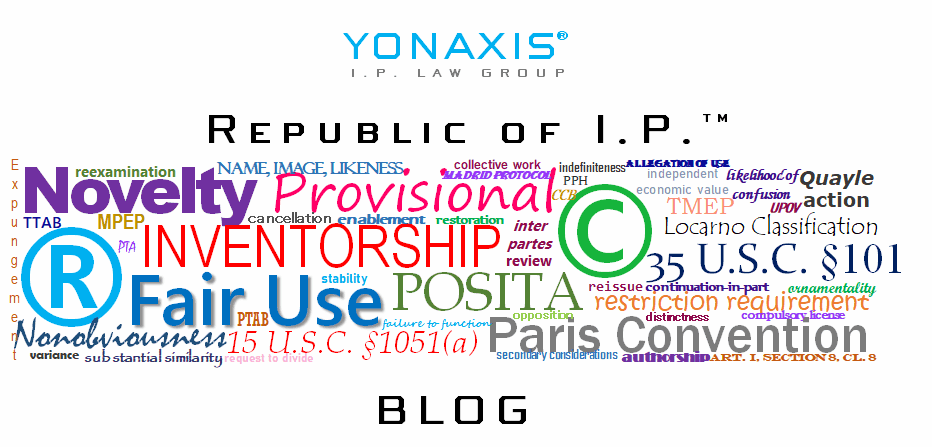On August 27, 2018, the Court of Appeals for the Federal Circuit issued a rare trademark ruling, Zheng Cai, dba Tai Chi Green Tea Inc. v. Diamond Hong, Inc.,[1] dealing with the more mundane aspects of proper filing procedures and rules of evidence. It also served as a reminder of the dangers of USPTO applicants …
Category: fed circuit watch
opinions by ct appeals for federal circuit (patent, trademark, some copyright)
Fed Circuit Watch: PTAB Error to Not Consider Arguments in Reply Brief
On August 27, 2018, the Court of Appeals for the Federal Circuit handed down Ericsson Inc. v. Intellectual Ventures I LLC,[1] in which the rules played an important role in decisions made in the case. The facts are as follows. Intellectual Ventures I owns U.S. Patent No. 5,602,831 (‘831), entitled “Optimizing packet size to eliminate …
Fed Circuit Watch: Enabling Scope of Design Patent Claims Expands – Greatly
In a potentially ground-breaking decision in design patent prosecution, the Court of Appeals for the Federal Circuit handed down In re Maatita,[1] on August 20, 2018. The facts are as follows. Ron Maatita filed a design patent application with the USPTO, Serial No. 29/404,677, claiming an athletic shoe sole design. As with all design patent …
Fed Circuit Watch: USPTO’s §315(b) “Real Party in Interest” Definition Too Narrow
Inter partes reviews (IPRs) (37 C.F.R. §42.100 et seq.) may be instituted by the USPTO, at its discretion, but there are some defined statutory requirements. On August 17, 2018, the Court of Appeals for the Federal Circuit unsealed an opinion that was originally written on July 9, 2018, Applications in Internet Time, LLC v. RPX Corp.,[1] which …
Fed Circuit Watch: Indexing Database Lacks Patent-Eligible Subject Matter Under §101
On August 15, 2018, the Court of Appeals for the Federal Circuit issued BSG Tech LLC v. Buyseasons, Inc.,[1] which represents one additional case in the §101 jurisprudence. This particular case bears striking resemblance to the Enfish case,[2] where the Fed Circuit upheld software claims directed to a self-referential table in a database, and therefore, …
Fed Circuit Watch: American Rule Does Not Require Applicants to Pay USPTO Attorneys’ Fees
“Each litigant pays his own attorney’s fees, win or lose.”[1] As such, the Court of Appeals for the Federal Circuit upheld the American Rule by holding that 35 U.S.C. §145 does not require losing applicants to pay USPTO attorneys’ fees in NantKwest, Inc. v. Iancu,[2] in an en banc decision handed down on July 27, …
Fed Circuit Watch: Result-Oriented Claims Not Patent-Eligible
This case is the latest iteration of a protracted litigation between non-practicing entity Interval Licensing and AOL.[1] In the current case, Interval Licensing LLC v. AOL, Inc.,[2] the Court of Appeals for the Federal Circuit ruled on July 20, 2018, that a claim that merely recites a result without how to achieve that result was …
Fed Circuit Watch: PTAB Anticipation Analysis All Wrong
Anticipation in patent law means the claimed invention lacks novelty, or is not new; in other words, the invention was already invented.[1] Anticipation, as codified in 35 U.S.C. §102(a) (or §102(b) in pre-AIA statute), is the gateway substantive legal analysis which must take place in order to assess patentability of an invention. Therefore, when the …
Fed Circuit Watch: Hyperlinked Material in Federal Register Notice is Prior Art
What constitutes prior art is not as easy as it may seem. While it may be uncontroverted that a Federal Register notice is prior art, the hyperlinked materials in that notice is what was at issue in Jazz Pharm., Inc. v. Amneal Pharm., Inc.,[1] decided by the Court of Appeals for the Federal Circuit on …
Fed Circuit Watch: No Sovereign Immunity in IPR
Sovereign immunity is the right of the government to not be sued absent waiver or consent. The federal government retains sovereign immunity rights.[1] States, through the Eleventh Amendment, also have sovereign immunity in federal courts.[2] Indian tribes also have sovereign immunity absent waiver or congressional abrogation.[3] This final type, tribal sovereign immunity, has never been …
